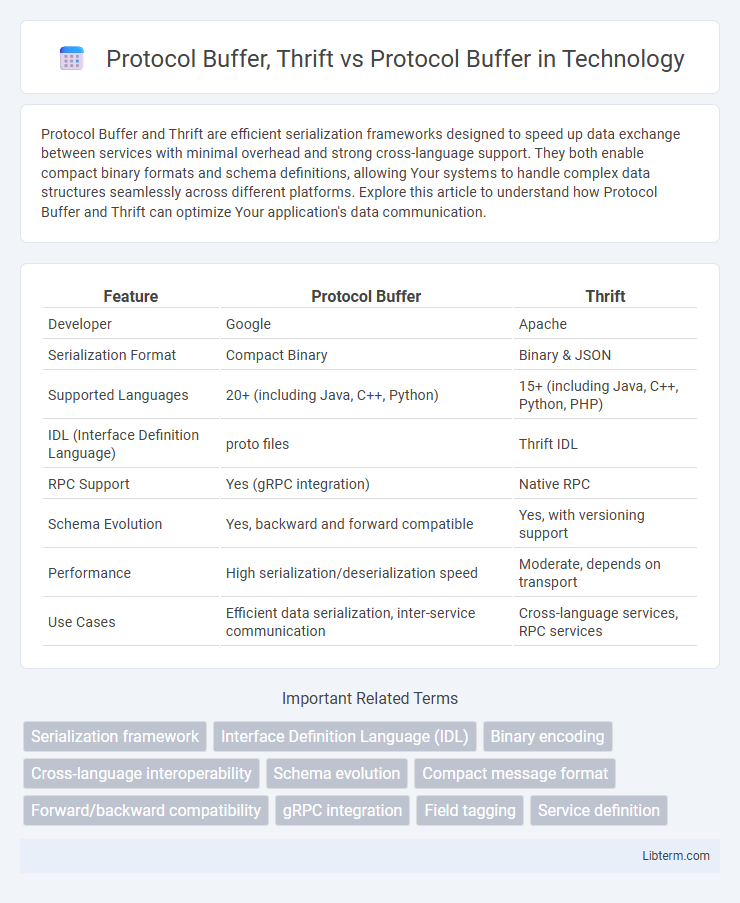Protocol Buffer and Thrift are efficient serialization frameworks designed to speed up data exchange between services with minimal overhead and strong cross-language support. They both enable compact binary formats and schema definitions, allowing Your systems to handle complex data structures seamlessly across different platforms. Explore this article to understand how Protocol Buffer and Thrift can optimize Your application's data communication.
Table of Comparison
| Feature | Protocol Buffer | Thrift |
|---|---|---|
| Developer | Apache | |
| Serialization Format | Compact Binary | Binary & JSON |
| Supported Languages | 20+ (including Java, C++, Python) | 15+ (including Java, C++, Python, PHP) |
| IDL (Interface Definition Language) | proto files | Thrift IDL |
| RPC Support | Yes (gRPC integration) | Native RPC |
| Schema Evolution | Yes, backward and forward compatible | Yes, with versioning support |
| Performance | High serialization/deserialization speed | Moderate, depends on transport |
| Use Cases | Efficient data serialization, inter-service communication | Cross-language services, RPC services |
Introduction to Protocol Buffers
Protocol Buffers is a language-neutral, platform-neutral serialization library developed by Google, designed for efficient data encoding and decoding. It uses a compact binary format that ensures faster transmission and smaller message sizes compared to Thrift, which supports multiple serialization formats but often results in larger payloads. Protocol Buffers excels in schema evolution, allowing backward and forward compatibility, making it a preferred choice for communication between microservices and long-term data storage.
Key Features of Protocol Buffers
Protocol Buffers, developed by Google, offer a compact, efficient binary serialization format ideal for structured data exchange, with strong backward and forward compatibility that supports schema evolution. Unlike Thrift, Protocol Buffers use a simple interface definition language (IDL) and provide faster serialization and deserialization speeds, making them highly suitable for performance-critical applications. Key features include language-neutral support, automatic code generation, and a well-optimized wire format that minimizes message size and maximizes processing efficiency.
What is Apache Thrift?
Apache Thrift is an open-source software framework for scalable cross-language services development, combining a software stack with a code generation engine to build services that communicate seamlessly across programming languages. Thrift supports numerous languages such as C++, Java, Python, and Ruby, facilitating efficient serialization and RPC (Remote Procedure Call) protocols. Compared to Protocol Buffers, Thrift provides a more comprehensive framework with built-in support for service definition, communication, and transport, making it suitable for distributed systems requiring robust inter-service communication.
Core Differences: Thrift vs Protocol Buffers
Thrift and Protocol Buffers differ primarily in their scope and versatility: Thrift offers an integrated framework combining an interface definition language (IDL), code generation, and a full RPC system supporting numerous programming languages, whereas Protocol Buffers focus mainly on efficient serialization with optional gRPC for RPC capabilities. Protocol Buffers prioritize compact, fast binary serialization with a simpler schema language, while Thrift provides more complex IDL features including service definitions and transport protocols. Core distinctions include Thrift's broader support for multiple transport layers and protocols versus Protocol Buffers' optimized serialization performance and widespread adoption in cloud-native environments.
Performance Comparison: Thrift and Protocol Buffers
Thrift and Protocol Buffers are both serialization frameworks designed for efficient data interchange, with Protocol Buffers typically outperforming Thrift in raw serialization and deserialization speed due to its simpler binary format. Thrift offers more flexibility with support for multiple transport protocols and service generation but introduces additional overhead that can reduce performance in latency-sensitive applications. Benchmarks consistently show Protocol Buffers providing faster encoding and decoding times, making it the preferred choice for high-performance use cases requiring compact message size and speed.
Language and Platform Support
Protocol Buffers support over 10 languages including C++, Java, Python, and Go, with strong cross-platform compatibility for mobile, desktop, and server environments. Apache Thrift offers extensive language support as well, covering C++, Java, Python, Ruby, PHP, and more, along with broad platform integration particularly for distributed systems and microservices. Both Protocol Buffers and Thrift enable seamless data serialization across heterogeneous systems, but Thrift's additional RPC framework provides enhanced support for diverse networked applications.
Serialization: Efficiency and Compactness
Protocol Buffer offers highly efficient serialization with compact binary output, reducing data size and speeding transmission compared to Thrift. Thrift supports multiple serialization formats but often produces larger payloads and slower processing due to its flexible, language-agnostic encoding. Protocol Buffer's optimized schema-driven approach ensures minimal overhead, making it superior for performance-critical applications requiring fast, lightweight data interchange.
Schema Evolution and Backward Compatibility
Protocol Buffer offers robust schema evolution with explicit field numbering, allowing backward and forward compatibility when adding or deprecating fields without breaking existing data. Thrift supports schema evolution but relies more heavily on careful manual management of field IDs and optional fields to maintain backward compatibility. Protocol Buffer's strict enforcement of field rules and optimized serialization make it preferable for systems requiring seamless backward compatibility during iterative schema changes.
Adoption and Use Cases in Industry
Protocol Buffer, developed by Google, boasts widespread adoption in large-scale systems for efficient serialization in RPC and data storage, favored for its compact format and speed. Apache Thrift, originated at Facebook, provides a versatile cross-language RPC framework with built-in code generation, making it popular for multi-language microservices architectures. Industries relying on high-performance, low-latency communication such as cloud platforms, IoT, and financial services often choose Protocol Buffer, while companies with heterogeneous tech stacks and extensive service interoperability lean toward Thrift.
Choosing Between Thrift and Protocol Buffers
Choosing between Thrift and Protocol Buffers depends largely on project requirements such as supported languages, serialization speed, and service definition needs. Protocol Buffers offer highly efficient serialization with strong backward compatibility, making them ideal for lightweight communication and data storage across numerous platforms. Thrift provides a comprehensive RPC framework with multi-language support and integrated service definitions, favoring complex microservices environments requiring both serialization and network communication.
Protocol Buffer, Thrift Infographic

 libterm.com
libterm.com